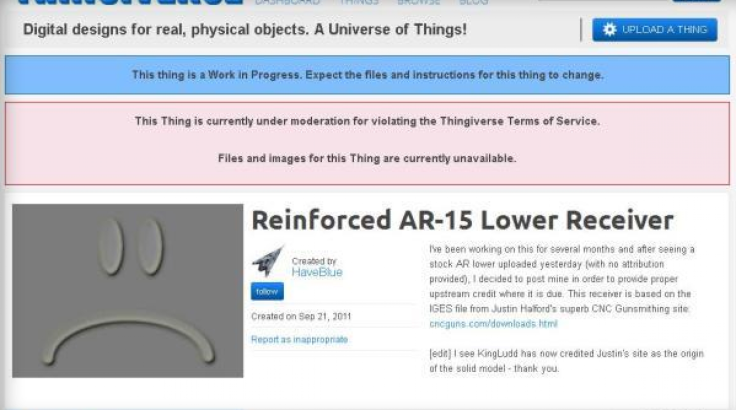MakerBot Pulls 3D Printable Guns From Thingiverse In Wake Of Sandy Hook Shooting
"I'm serious about civil liberties even when they are unpopular,” Wilson says of his work for Defense Distributed.

Earlier this month, when Rep. Steve Israel (D-N.Y.) held an impromptu press conference in New York to express his opposition to the unregulated production of 3D-printed guns, his words didn’t gain much traction. But as politicians swoop in on the gun control debate in the wake of the Sandy Hook shooting, the practice of manufacturing firearms from materials assembled by 3D printers has come under a fresh round of scrutiny.
MakerBot, a startup that makes relatively cheap, consumer-oriented 3D printers, pulled plans for the lower receiver of an AR-15 semi automatic rifle from its blueprint database known as the Thingiverse on Thursday, saying that the item violated the company’s terms of service.
“MakerBot's focus is to empower the creative process and make things for good,” the company said in a statement. “MakerBot Desktop 3D Printers make innovative products, new tools, models, fashion items, works of art, and 3D things of all types.”
“Thingiverse's Terms of Service state that users agree not to use Thingiverse ‘to collect, upload, transmit, display, or distribute any User Content (ii) that...promotes illegal activities or contributes to the creation of weapons, illegal materials or is otherwise objectionable.’ If an item has been removed, it is because it violates the Thingiverse Terms of Service,” the statement concluded.
The prototype, developed by the amateur gunsmith Michael Guslick, was freely available if not yet fully functional. When I spoke with Guslick about his work last month, he said that the project was more of “an interesting technical challenge” than an effective way to manufacture weapons.
Speaking to CNET, MakerBot attorney Richard McCarthy said that the company’s "Thingiverse has always been, and is currently, evolving...as is the company as it pursues innovation and growth. We have always had the discretion to take action for policy violations.”
Guslick first uploaded his design to the Thingiverse before the language was introduced to MakerBot’s terms of service last February. But the AR-15 lower receiver has remained there undisturbed until now, suggesting that MakerBot’s enforcement of its own policies, rather than the policies themselves, is what’s changing.
“Recent events served as the impetus here to take immediate action (and there were several) and reiterate or emphasize the site's focus on creative empowerment for products that have a positive impact," McCarthy added.
After hearing Israel’s comments on the regulation of 3D printed firearms earlier this month, I reached out to Guslick again for comment on the story, asking if he saw any similarity between the policy debates over computer aided design (CAD) files -- the software that makes dissemination of 3D printable blueprints so easy -- and pornography, given the fact that regulating access to both materials becomes exceedingly difficult, if not impossible, once they are posted online in any form.
“I kind of bypassed your question of 'Wiki Weapons' in the vein of internet pornography in my previous response, as it didn't seem to be an apt comparison in my mind, and I had been mulling over alternate analogies,” Guslick wrote in an email Thursday. “However, given the tragic shooting of last week, the following vilification of guns and gun owners, and Thingiverse's takedowns of firearms related files, your comparison now seems downright prescient.”
Meanwhile, Cody Wilson, the founder of Defense Distributed and creator of the "Wiki Weapon" project, said that he plans to create a new website for "hosting 'fugitive' 3D-printable gun files in the next few hours” after the project ends, according to the BBC.
"The internet routes around censorship," he said. "The project becomes more vital."
Defense Distributed has remained relatively quiet in the aftermath of the Sandy Hook shooting last week, occasionally jabbing at critics from its Twitter account.
“Freedom is definitely the problem. You're right,” one message said on the day of the shooting when another user asked how the organization “will feel when one of their guns is used to kill children like those lost in Newtown, CT today?”
“My favorite piece,” Wilson said in an email when asked if Sandy Hook had changed his outlook on Defense Distributed. “If the shooting changed my mind about civil liberties, you'd be right to recognize I wasn't serious.”
“Come now,” he added. “I'm not a flippant politician. I'm serious about civil liberties even when they are unpopular.”
© Copyright IBTimes 2024. All rights reserved.












